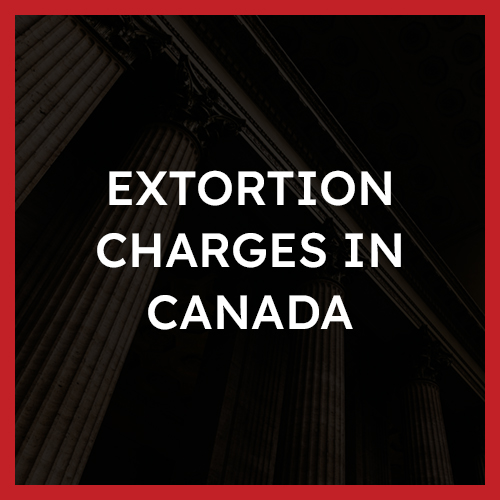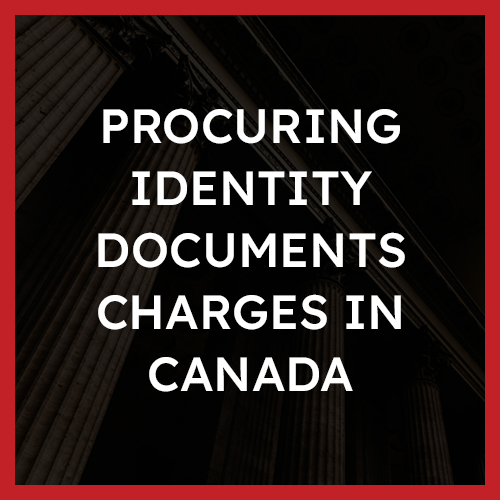Extortion (s. 346 (1)) Charges in Canada: Offences, Defences, Punishments
What is Extortion?
 Extortion is an offence which is covered under s.346(1) of the Criminal Code.
Extortion is an offence which is covered under s.346(1) of the Criminal Code.
Extortion is defined in the Criminal Code as making “threats, accusations, menaces or violence” in order to force the complainant to do something, which usually involves, but is not limited to, paying a sum of money. However, a threat to sue is not considered a “threat” amounting to an extortion charge.
Extortion is a serious offence in Canada. The Crown does not have the liberty to choose whether to proceed by indictment or summarily as extortion is a straight indictable offence.
Examples
Some common examples of extortion may include the following:
- Ransomware attacks;
- Using sexually explicit photos/videos to extort until a sum of money is paid;
- Threatening to expose an affair;
- Threatening to injure a person or property;
- Threatening to expose a celebrity’s address unless they give you some property or money;
- Threatening to hurt someone if they do not pay you back a debt that they owe;
- Threatening to hurt someone’s family or friends if they don’t give you something; and
- Telling your ex that you will accuse them of rape unless they give you money.
Defences
A strong defence to an extortion charge will depend on the circumstances of your case. However, some common defence’s against an extortion charge include:
- Having a reasonable justification or excuse;
- Showcasing you were threatening legal proceedings; and
- Any applicable Charter defence
Punishment
Extortion is usually a very fact-specific offence, which means that the penalty can vary significantly. Regardless, extortion is a serious crime as it is a straight indictable offence and can carry with it severe penalties. If convicted of extortion, even if it is your first offence, you are likely to face jail time and receive a criminal record. There is no minimum sentence associated with extortion, however, the maximum sentence for extortion is life in prison.
However, if the extortion involved restricted/prohibited firearms, or if it is related to a criminal organization, then there is a minimum sentence of five years in jail. This penalty increases to a minimum of seven years in prison if you have been convicted of extortion (or other firearm-related offences) in the past ten years.
Extortion Laws in Canada Infographic
Overview of the Offence
According to s.346(1) of the Criminal Code:
Every one commits extortion who, without reasonable justification or excuse and with intent to obtain anything, by threats, accusations, menaces or violence induces or attempts to induce any person, whether or not he is the person threatened, accused or menaced or to whom violence is shown, to do anything or cause anything to be done.
The wording in s.346(1) of the Criminal Code indicates that the definition of extortion applies to both successful extortions and unsuccessful attempts to extort.
In order for the Crown to secure a conviction for extortion the actus reus of the offence, the mens rea of the offence, and that there was no reasonable justification, must be proven beyond a reasonable doubt.
The Guilty Act (Actus Reus)
The actus reus for extortion is established by proof, beyond a reasonable doubt, of the following:
- The accused used “threats, accusations, menaces or violence” against the complainant; and
- The prohibited conduct was to induce or attempt to induce any person to do anything
As indicated in the case of R v McClure, 1957 CanLII 485 (MB CA) what amounts to “threats, accusations, menaces, or violence” is a question of fact. This means that the court will take into account the particular circumstances of each case to determine whether or not the alleged threat was in fact threats within the meaning of this offence. As such, in certain circumstances, as the court in R v Barros, 2016 ABQB 243 (CanLII) indicated, that even a veiled reference could constitute a threat if it conveys to the complaint the consequences which the complainant fears or would prefer to avoid.
In addition to the actus reus and the mens rea for extortion, the Crown may need to prove the following aggravating factors which would aid in determining the appropriate penalty for the conviction of an extortion conviction.
The following aggravating factors may be proven:
- A restricted or prohibited firearm was used in the commission of the offence
- A firearm was used in the commission of the offence or
- The offence was committed for the benefit of, at the direction of, or in association with, a criminal organization
The Guilty Mind (Mens Rea)
The mens rea for extortion is established by proving, beyond a reasonable doubt, that the accused:
- Intending to deprive the owner of their property or to gain the advantage by prohibited conduct of threats, accusations, menaces or violence.
Extortion under s.346(1) of the Criminal Code is broadly worded and criminalizes threats of any kind made in an attempt to any person to do anything. As such, in order to secure a conviction of extortion, the Crown must be able to showcase that the accused possessed the requisite intention to use threats, accusations, menaces or violence for the purpose of gaining anything. However, it is important to note that the extortion does not need to be successful, rather any attempts to extort will suffice the men’s rea element of the offence as well.
Reasonable Justification
The Supreme Court in R v Natarelli,1967 CanLII 11 (SCC) indicated that the ultimate burden of persuasion is on the Crown to demonstrate beyond a reasonable doubt the absence of any reasonable justification or excuse. The word “reasonable” must be determined objectively by the courts. This means that it does not matter whether or not the accused believed that the threats were reasonably justifiable or excusable, but rather what matters is to determine whether a reasonable person in the accused’s position would have formed that view.
Extortion Defences
How to Beat an Extortion Charge
The availability and strength of any defence are highly dependent on the specific facts of your case.
However, the common defences against a charge of extortion include the following:
- reasonable justification/excuse;
- the threat of legal proceedings; and
- any applicable Charter defence.
Reasonable Justification / Excuse
Under s.346 of the Criminal Code, if the threats you made were made with reasonable justification or excuse, then you cannot be convicted of extortion. However, the Criminal Code does not define what “reasonable justification” is. Rather, the courts have concluded that the phrase “reasonable justification or excuse” is usually a very fact-specific inquiry.
The courts tend to look at the context of the threat, and the “legitimacy” of the method being used to determine whether or not something is a reasonable justification or excuse. The purpose of the “reasonable justification or excuse” defence is to draw a line between lawful hard bargaining and criminal blackmail. If you are able to demonstrate that the threats you made did not constitute extortion, as you had a reasonable justification or excuse, the Crown cannot convict you of extortion.
Threat of legal proceedings
Under s.346(2) of the Criminal Code, a threat to institute civil proceedings is not a threat for the purposes of an offence of extortion. This means that if you are threatening to sue someone that does not count as extortion, and you cannot be convicted of the offence. However, it is important to note that in some circumstances, an individual can still be charged with extortion if they threaten someone in order to obtain something they are legally entitled to.
Charter Defences
The Charter sets out your rights and freedoms before and after your arrest. In the event that the police fail to abide by these rights, either deliberately or inadvertently, it could aid in your defence for a charge of extortion. If any of your Charter rights have been violated before or after your arrest, you may be able to have some or all of the evidence that the Crown is relying on to secure a conviction excluded under s.24(2) of the Charter
Extortion Punishment
The punishment associated with an extortion conviction can vary as extortion is a very fact-specific offence. However, even for a first offence, you may receive a jail sentence.
Extortion, with the use of a restricted or prohibited firearm, or any firearm, in committing for a criminal organization
If you have been convicted of extortion under either s.346(1) or 346((1)1.1) of the Criminal Code then there is a minimum sentence of five years in jail. This penalty increases to a minimum of seven years in prison if you have been convicted of extortion (or other firearm-related offences) in the past ten years. The maximum sentence would be life imprisonment.
You also would only have available to you a fine and prison sentence or prison only. Note you do not have available to you a discharge, a suspended sentence, a fine alone, a fine and probation, intermittent, fine, probation and intermittent, or a conditional sentence.
Extortion, use of a firearm
If you have been convicted of extortion under s.346(1)(1.1)(a.1) then there is a minimum sentence of 4 years in jail. However, the maximum sentence would be life imprisonment.
You also would only have available to you a fine and prison sentence or prison only. Note you do not have available to you a discharge, a suspended sentence, a fine alone, a fine and probation, intermittent, fine, probation and intermittent, or a conditional sentence.
Frequently Asked Questions
Is extortion a crime in Canada?
Yes, extortion is a crime in Canada and is covered under s.346 of the Criminal Code. This is a serious offence in Canada as it is an indictable offence and the Crown does not have available to them the option to proceed otherwise. An extortion conviction can lead to lengthy jail sentences, even if it is your first offence.
What is considered extortion in Canada?
Extortion for the purposes of s.346 of the Criminal Code is broadly worded in that it criminalizes threats of any kind made in an attempt to any person to do anything. However, it is important to note that threatening to sue someone does not amount to extortion.
For example, extortion can occur when:
- you induce or attempt to induce another person to do anything or cause anything to be done;
- you use threats, accusations, violence, or menaces to induce another person to do anything or cause anything to be done; or
- blackmailing an individual.
Can you go to jail for extortion?
Yes, you can go to jail for extortion. There are no minimum sentences imposed with extortion convictions, but the maximum sentence for an extortion conviction is life imprisonment.
However, if the extortion involved restricted/prohibited firearms, or if it is related to a criminal organization, then there is in fact a minimum sentence of five years in jail. This penalty also increases to a minimum of seven years in prison if you have been convicted of extortion (or other firearm-related offences) in the past ten years.
Published Decisions
R v Barros, 2011 SCC 51
The accused in this case was a former police officer turned private investigator. The accused was retained by a lawyer of a man accused of drug trafficking to review the Crown’s case against him, which was based on information received from a police informant. The accused took steps to determine the identity of the police informant. The accused met with the investigating officer and stated that it was widely known what happens when the identity of informants is discovered and stated that “We don’t want to get anyone hurt here”. The accused was charged with obstruction of justice and two counts of extortion.
You can read the full decision here.
R v Curtis, 2022 NLSC 66 (CanLII)
In this case, the accused threatened to publish private health information of third-party patients online with the intention of inducing the health authority to engage with him because the accused wanted compensation, as he believed that the health authority repeatedly violated his rights. The Court found that the accused acted without reasonable justification or excuse and was convicted of extortion.
You can read the full decision here.
R v Friesen, 2020 SCC 9 (CanLII)
In this case, the accused pleaded guilty to sexual interference and attempted extortion of the victim’s mother. The accused was sentenced to six years in jail for sexual interference and a concurrent six-year sentence for attempted extortion.
You can read the full decision here.
About The Author
Ask A Question
We endeavor to respond to questions within 24 hours. If your matter is urgent, please call our office or submit a request for a free consultation.








